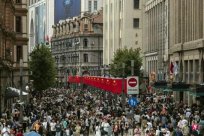A official report from Japan, Japan's export value to Huada products in August decreased by more than 65 % compared with the same period last year.
According to the Japanese Kyodo News Agency, the data released by the Ministry of Agriculture and Forestry Aquatic Products of Japan on Friday (October 6) shows that Japan's export of aquatic products in China in AugustAt the same time, about 33 million yuan), a decrease of 65.7%compared with the same period last year, and the export volume decreased for the second month year -on -year.In July, Japan's exports to Huadui products were 7.7 billion yuan, a year -on -year decrease of 23.2%.The export volume of scallops and sea cucumbers has been severe, causing a great blow to the origin of the origin.
This coincides with the water from Tokyo Electric Power Fukushima First Nuclear Power Station to deal with the sea before the sea was exhausted in August. China has strengthened radioactive substance testing since July, and subsequently suspended import Japanese aquatic products.
It is reported that the export amount of Huada products in Japan in September is expected to further decline.In August, Japan decreased by 36.3%to the total exports of Chinese, forestry and aquatic products and food, and 17.5 billion yuan, of which scallop exports decreased by 71.3%to 1.6 billion yuan.
Japan increased by 15.5%to 6.9 billion yen exports to Hong Kong aquatic products in August, and increased by 54%to 900 million yuan year -on -year after a month.The total exports of Japan's farming and forestry and aquatic products and food in Japan increased by 4.6%to 17.6 billion yuan.After starting the first round of water for the sea, Hong Kong banned the imports of water products from 10 cities including Fukushima.
Because the Fukushima First Nuclear Power Station processed water on August 24, China announced that it will be fully suspended from the same day to the import of Japanese aquatic products.China's latest ban has expanded to Japan.Earlier, China banned the imports of aquatic products in ten counties in Japan, including Fukushima Prefecture, Tokyo Metropolis, Chiba Prefecture, etc., and strictly reviewed the document of foods, especially aquatic products from other parts of Japan, and implemented 100 % inspection.Essence




